Author note: Reflective skills in healthcare professionals
VerifiedAdded on 2021/06/14
|8
|1996
|228
AI Summary
The professor has provided us a video which shows the way by which a nursing professional established therapeutic relationship with the patient and was successfully able to follow the standard 2 of NMBA code of conduct. He successfully indulged the patient in light conversations by which the patient developed a liking for the nursing professional.
Contribute Materials
Your contribution can guide someone’s learning journey. Share your
documents today.
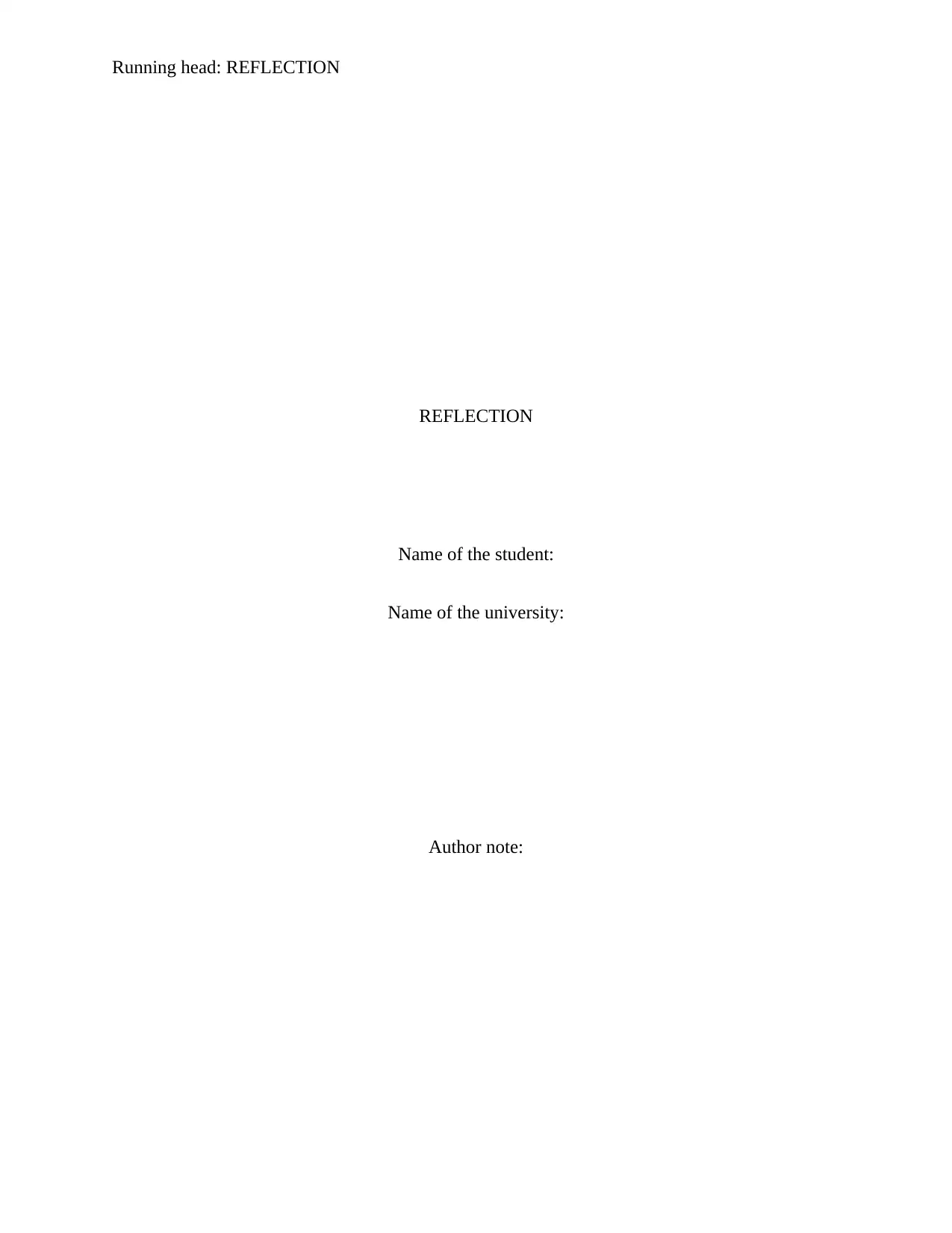
Running head: REFLECTION
REFLECTION
Name of the student:
Name of the university:
Author note:
REFLECTION
Name of the student:
Name of the university:
Author note:
Secure Best Marks with AI Grader
Need help grading? Try our AI Grader for instant feedback on your assignments.
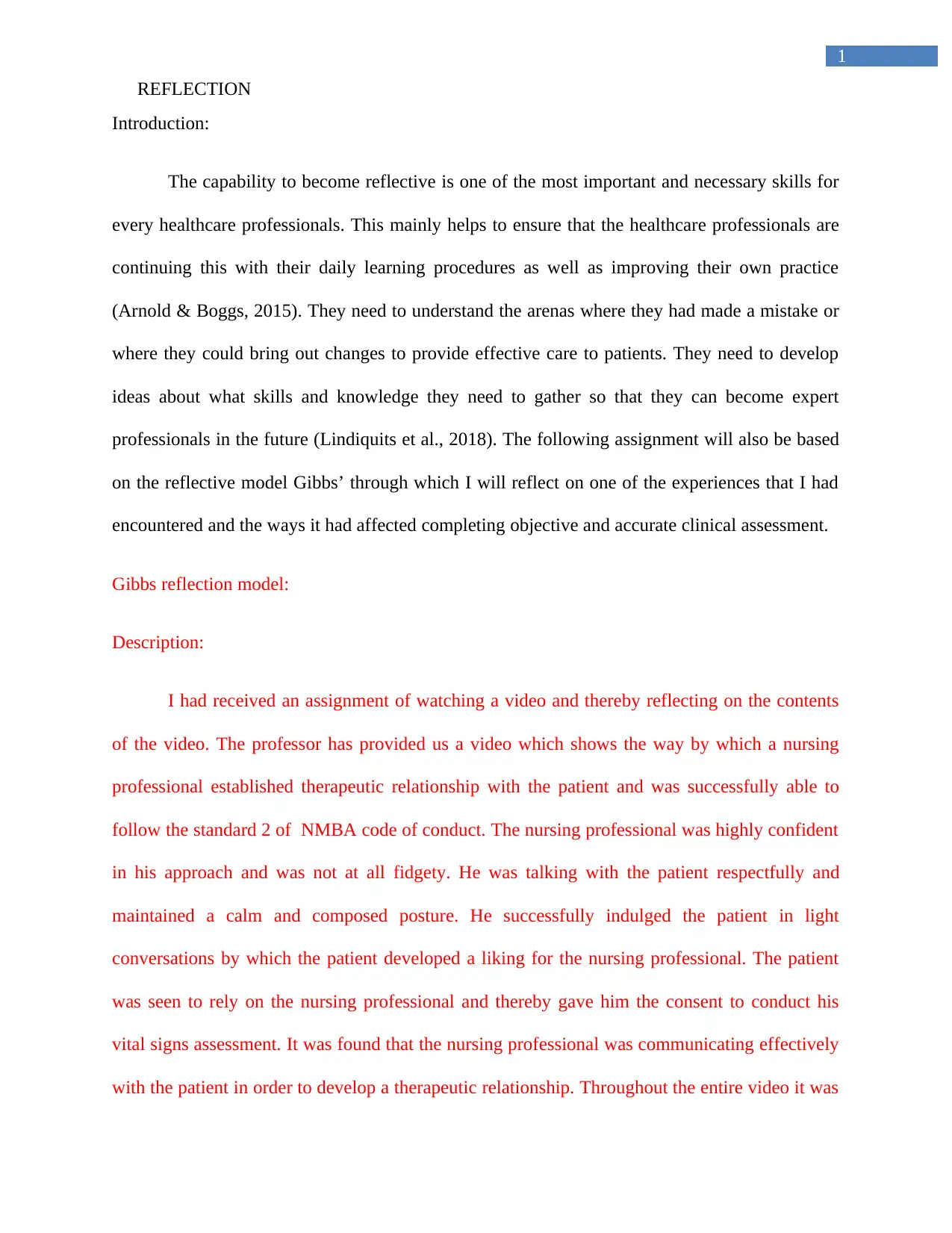
1
REFLECTION
Introduction:
The capability to become reflective is one of the most important and necessary skills for
every healthcare professionals. This mainly helps to ensure that the healthcare professionals are
continuing this with their daily learning procedures as well as improving their own practice
(Arnold & Boggs, 2015). They need to understand the arenas where they had made a mistake or
where they could bring out changes to provide effective care to patients. They need to develop
ideas about what skills and knowledge they need to gather so that they can become expert
professionals in the future (Lindiquits et al., 2018). The following assignment will also be based
on the reflective model Gibbs’ through which I will reflect on one of the experiences that I had
encountered and the ways it had affected completing objective and accurate clinical assessment.
Gibbs reflection model:
Description:
I had received an assignment of watching a video and thereby reflecting on the contents
of the video. The professor has provided us a video which shows the way by which a nursing
professional established therapeutic relationship with the patient and was successfully able to
follow the standard 2 of NMBA code of conduct. The nursing professional was highly confident
in his approach and was not at all fidgety. He was talking with the patient respectfully and
maintained a calm and composed posture. He successfully indulged the patient in light
conversations by which the patient developed a liking for the nursing professional. The patient
was seen to rely on the nursing professional and thereby gave him the consent to conduct his
vital signs assessment. It was found that the nursing professional was communicating effectively
with the patient in order to develop a therapeutic relationship. Throughout the entire video it was
REFLECTION
Introduction:
The capability to become reflective is one of the most important and necessary skills for
every healthcare professionals. This mainly helps to ensure that the healthcare professionals are
continuing this with their daily learning procedures as well as improving their own practice
(Arnold & Boggs, 2015). They need to understand the arenas where they had made a mistake or
where they could bring out changes to provide effective care to patients. They need to develop
ideas about what skills and knowledge they need to gather so that they can become expert
professionals in the future (Lindiquits et al., 2018). The following assignment will also be based
on the reflective model Gibbs’ through which I will reflect on one of the experiences that I had
encountered and the ways it had affected completing objective and accurate clinical assessment.
Gibbs reflection model:
Description:
I had received an assignment of watching a video and thereby reflecting on the contents
of the video. The professor has provided us a video which shows the way by which a nursing
professional established therapeutic relationship with the patient and was successfully able to
follow the standard 2 of NMBA code of conduct. The nursing professional was highly confident
in his approach and was not at all fidgety. He was talking with the patient respectfully and
maintained a calm and composed posture. He successfully indulged the patient in light
conversations by which the patient developed a liking for the nursing professional. The patient
was seen to rely on the nursing professional and thereby gave him the consent to conduct his
vital signs assessment. It was found that the nursing professional was communicating effectively
with the patient in order to develop a therapeutic relationship. Throughout the entire video it was
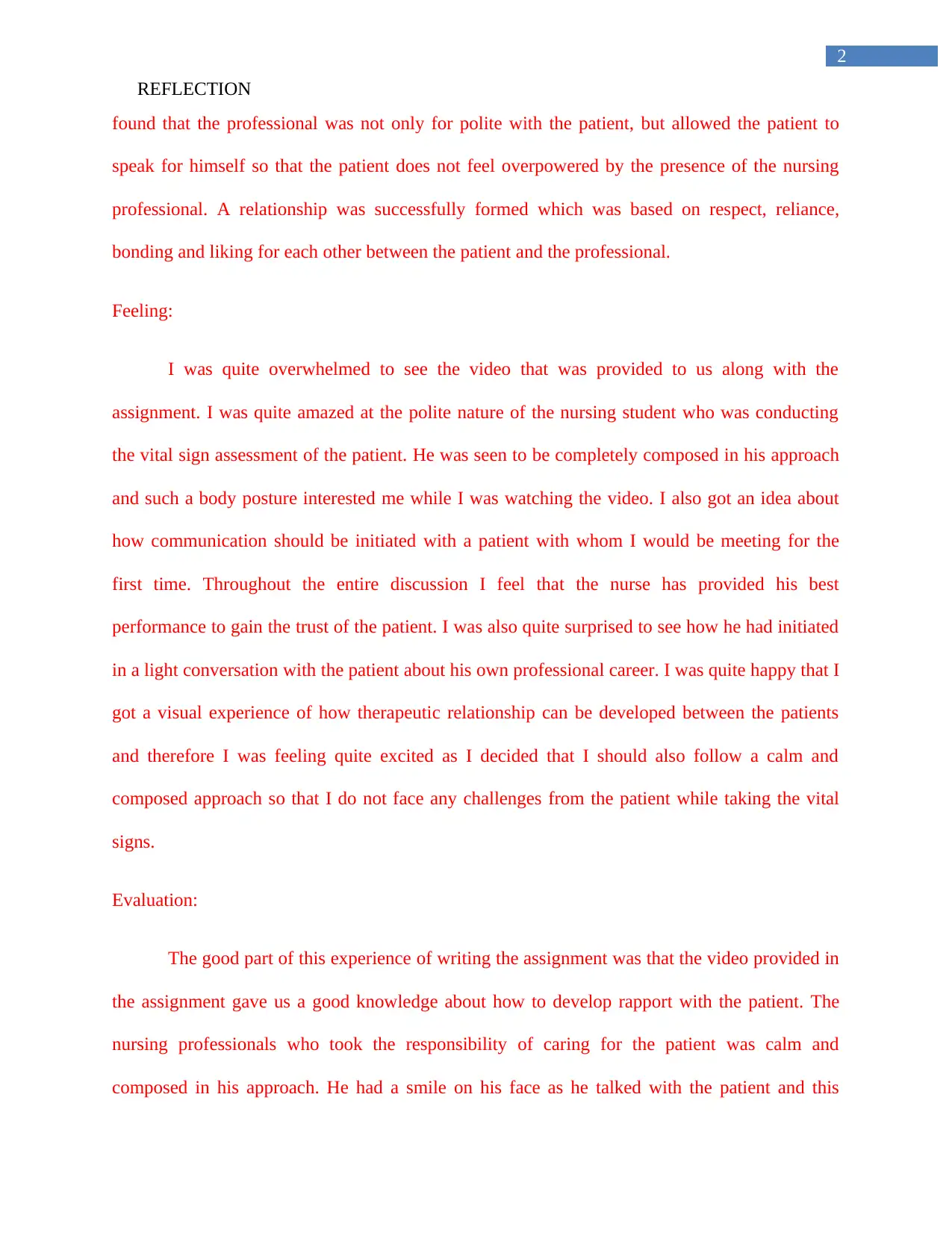
2
REFLECTION
found that the professional was not only for polite with the patient, but allowed the patient to
speak for himself so that the patient does not feel overpowered by the presence of the nursing
professional. A relationship was successfully formed which was based on respect, reliance,
bonding and liking for each other between the patient and the professional.
Feeling:
I was quite overwhelmed to see the video that was provided to us along with the
assignment. I was quite amazed at the polite nature of the nursing student who was conducting
the vital sign assessment of the patient. He was seen to be completely composed in his approach
and such a body posture interested me while I was watching the video. I also got an idea about
how communication should be initiated with a patient with whom I would be meeting for the
first time. Throughout the entire discussion I feel that the nurse has provided his best
performance to gain the trust of the patient. I was also quite surprised to see how he had initiated
in a light conversation with the patient about his own professional career. I was quite happy that I
got a visual experience of how therapeutic relationship can be developed between the patients
and therefore I was feeling quite excited as I decided that I should also follow a calm and
composed approach so that I do not face any challenges from the patient while taking the vital
signs.
Evaluation:
The good part of this experience of writing the assignment was that the video provided in
the assignment gave us a good knowledge about how to develop rapport with the patient. The
nursing professionals who took the responsibility of caring for the patient was calm and
composed in his approach. He had a smile on his face as he talked with the patient and this
REFLECTION
found that the professional was not only for polite with the patient, but allowed the patient to
speak for himself so that the patient does not feel overpowered by the presence of the nursing
professional. A relationship was successfully formed which was based on respect, reliance,
bonding and liking for each other between the patient and the professional.
Feeling:
I was quite overwhelmed to see the video that was provided to us along with the
assignment. I was quite amazed at the polite nature of the nursing student who was conducting
the vital sign assessment of the patient. He was seen to be completely composed in his approach
and such a body posture interested me while I was watching the video. I also got an idea about
how communication should be initiated with a patient with whom I would be meeting for the
first time. Throughout the entire discussion I feel that the nurse has provided his best
performance to gain the trust of the patient. I was also quite surprised to see how he had initiated
in a light conversation with the patient about his own professional career. I was quite happy that I
got a visual experience of how therapeutic relationship can be developed between the patients
and therefore I was feeling quite excited as I decided that I should also follow a calm and
composed approach so that I do not face any challenges from the patient while taking the vital
signs.
Evaluation:
The good part of this experience of writing the assignment was that the video provided in
the assignment gave us a good knowledge about how to develop rapport with the patient. The
nursing professionals who took the responsibility of caring for the patient was calm and
composed in his approach. He had a smile on his face as he talked with the patient and this
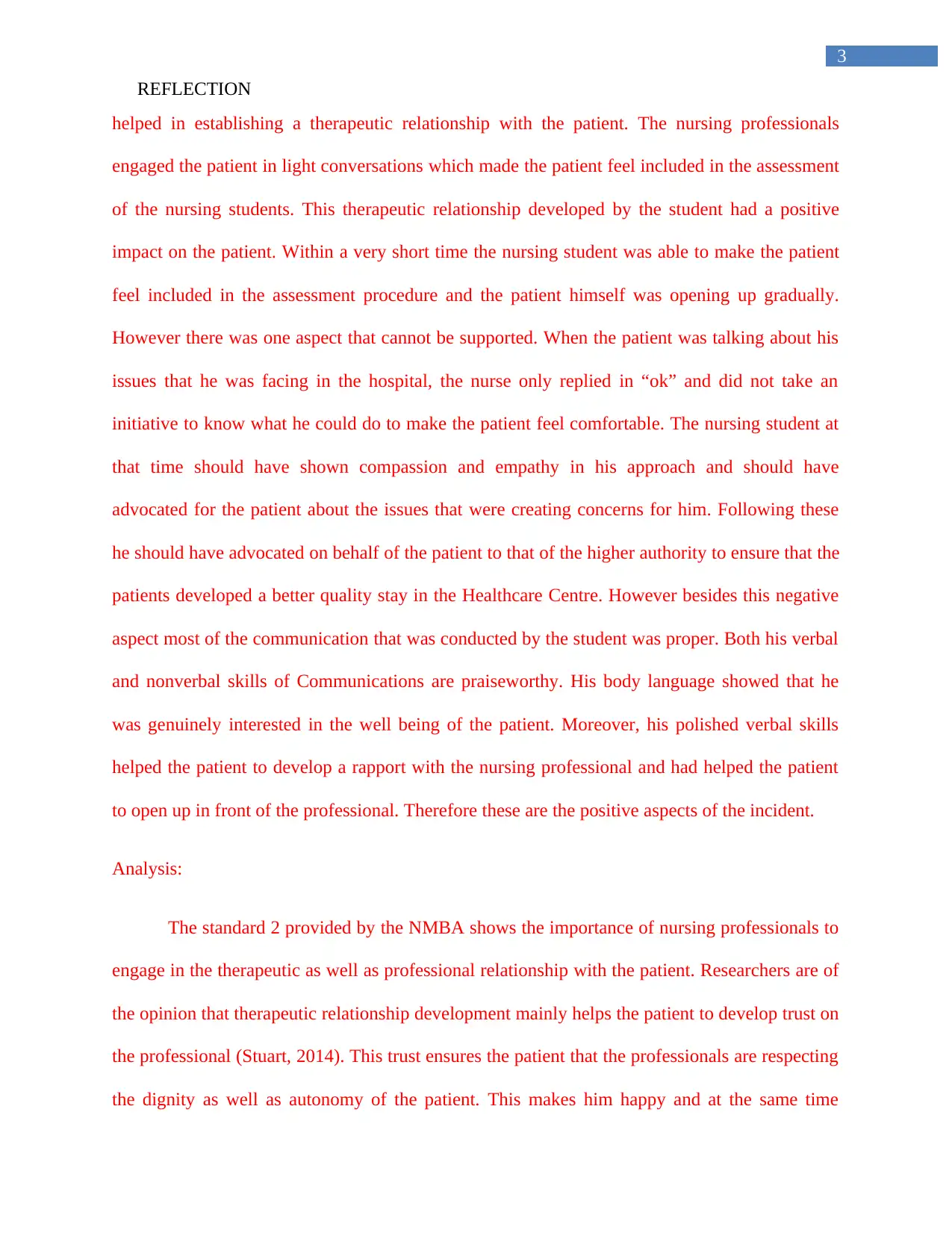
3
REFLECTION
helped in establishing a therapeutic relationship with the patient. The nursing professionals
engaged the patient in light conversations which made the patient feel included in the assessment
of the nursing students. This therapeutic relationship developed by the student had a positive
impact on the patient. Within a very short time the nursing student was able to make the patient
feel included in the assessment procedure and the patient himself was opening up gradually.
However there was one aspect that cannot be supported. When the patient was talking about his
issues that he was facing in the hospital, the nurse only replied in “ok” and did not take an
initiative to know what he could do to make the patient feel comfortable. The nursing student at
that time should have shown compassion and empathy in his approach and should have
advocated for the patient about the issues that were creating concerns for him. Following these
he should have advocated on behalf of the patient to that of the higher authority to ensure that the
patients developed a better quality stay in the Healthcare Centre. However besides this negative
aspect most of the communication that was conducted by the student was proper. Both his verbal
and nonverbal skills of Communications are praiseworthy. His body language showed that he
was genuinely interested in the well being of the patient. Moreover, his polished verbal skills
helped the patient to develop a rapport with the nursing professional and had helped the patient
to open up in front of the professional. Therefore these are the positive aspects of the incident.
Analysis:
The standard 2 provided by the NMBA shows the importance of nursing professionals to
engage in the therapeutic as well as professional relationship with the patient. Researchers are of
the opinion that therapeutic relationship development mainly helps the patient to develop trust on
the professional (Stuart, 2014). This trust ensures the patient that the professionals are respecting
the dignity as well as autonomy of the patient. This makes him happy and at the same time
REFLECTION
helped in establishing a therapeutic relationship with the patient. The nursing professionals
engaged the patient in light conversations which made the patient feel included in the assessment
of the nursing students. This therapeutic relationship developed by the student had a positive
impact on the patient. Within a very short time the nursing student was able to make the patient
feel included in the assessment procedure and the patient himself was opening up gradually.
However there was one aspect that cannot be supported. When the patient was talking about his
issues that he was facing in the hospital, the nurse only replied in “ok” and did not take an
initiative to know what he could do to make the patient feel comfortable. The nursing student at
that time should have shown compassion and empathy in his approach and should have
advocated for the patient about the issues that were creating concerns for him. Following these
he should have advocated on behalf of the patient to that of the higher authority to ensure that the
patients developed a better quality stay in the Healthcare Centre. However besides this negative
aspect most of the communication that was conducted by the student was proper. Both his verbal
and nonverbal skills of Communications are praiseworthy. His body language showed that he
was genuinely interested in the well being of the patient. Moreover, his polished verbal skills
helped the patient to develop a rapport with the nursing professional and had helped the patient
to open up in front of the professional. Therefore these are the positive aspects of the incident.
Analysis:
The standard 2 provided by the NMBA shows the importance of nursing professionals to
engage in the therapeutic as well as professional relationship with the patient. Researchers are of
the opinion that therapeutic relationship development mainly helps the patient to develop trust on
the professional (Stuart, 2014). This trust ensures the patient that the professionals are respecting
the dignity as well as autonomy of the patient. This makes him happy and at the same time
Secure Best Marks with AI Grader
Need help grading? Try our AI Grader for instant feedback on your assignments.
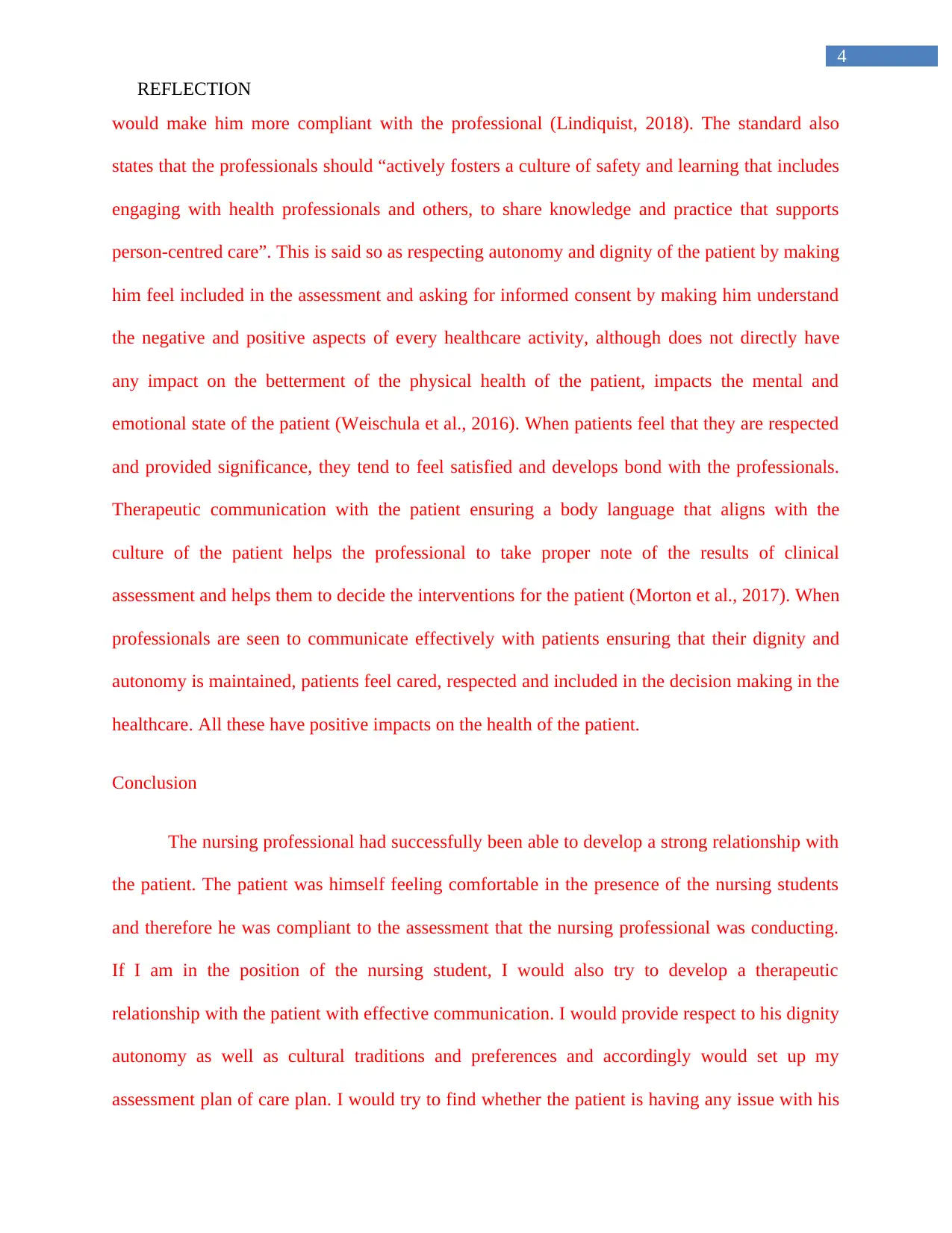
4
REFLECTION
would make him more compliant with the professional (Lindiquist, 2018). The standard also
states that the professionals should “actively fosters a culture of safety and learning that includes
engaging with health professionals and others, to share knowledge and practice that supports
person-centred care”. This is said so as respecting autonomy and dignity of the patient by making
him feel included in the assessment and asking for informed consent by making him understand
the negative and positive aspects of every healthcare activity, although does not directly have
any impact on the betterment of the physical health of the patient, impacts the mental and
emotional state of the patient (Weischula et al., 2016). When patients feel that they are respected
and provided significance, they tend to feel satisfied and develops bond with the professionals.
Therapeutic communication with the patient ensuring a body language that aligns with the
culture of the patient helps the professional to take proper note of the results of clinical
assessment and helps them to decide the interventions for the patient (Morton et al., 2017). When
professionals are seen to communicate effectively with patients ensuring that their dignity and
autonomy is maintained, patients feel cared, respected and included in the decision making in the
healthcare. All these have positive impacts on the health of the patient.
Conclusion
The nursing professional had successfully been able to develop a strong relationship with
the patient. The patient was himself feeling comfortable in the presence of the nursing students
and therefore he was compliant to the assessment that the nursing professional was conducting.
If I am in the position of the nursing student, I would also try to develop a therapeutic
relationship with the patient with effective communication. I would provide respect to his dignity
autonomy as well as cultural traditions and preferences and accordingly would set up my
assessment plan of care plan. I would try to find whether the patient is having any issue with his
REFLECTION
would make him more compliant with the professional (Lindiquist, 2018). The standard also
states that the professionals should “actively fosters a culture of safety and learning that includes
engaging with health professionals and others, to share knowledge and practice that supports
person-centred care”. This is said so as respecting autonomy and dignity of the patient by making
him feel included in the assessment and asking for informed consent by making him understand
the negative and positive aspects of every healthcare activity, although does not directly have
any impact on the betterment of the physical health of the patient, impacts the mental and
emotional state of the patient (Weischula et al., 2016). When patients feel that they are respected
and provided significance, they tend to feel satisfied and develops bond with the professionals.
Therapeutic communication with the patient ensuring a body language that aligns with the
culture of the patient helps the professional to take proper note of the results of clinical
assessment and helps them to decide the interventions for the patient (Morton et al., 2017). When
professionals are seen to communicate effectively with patients ensuring that their dignity and
autonomy is maintained, patients feel cared, respected and included in the decision making in the
healthcare. All these have positive impacts on the health of the patient.
Conclusion
The nursing professional had successfully been able to develop a strong relationship with
the patient. The patient was himself feeling comfortable in the presence of the nursing students
and therefore he was compliant to the assessment that the nursing professional was conducting.
If I am in the position of the nursing student, I would also try to develop a therapeutic
relationship with the patient with effective communication. I would provide respect to his dignity
autonomy as well as cultural traditions and preferences and accordingly would set up my
assessment plan of care plan. I would try to find whether the patient is having any issue with his
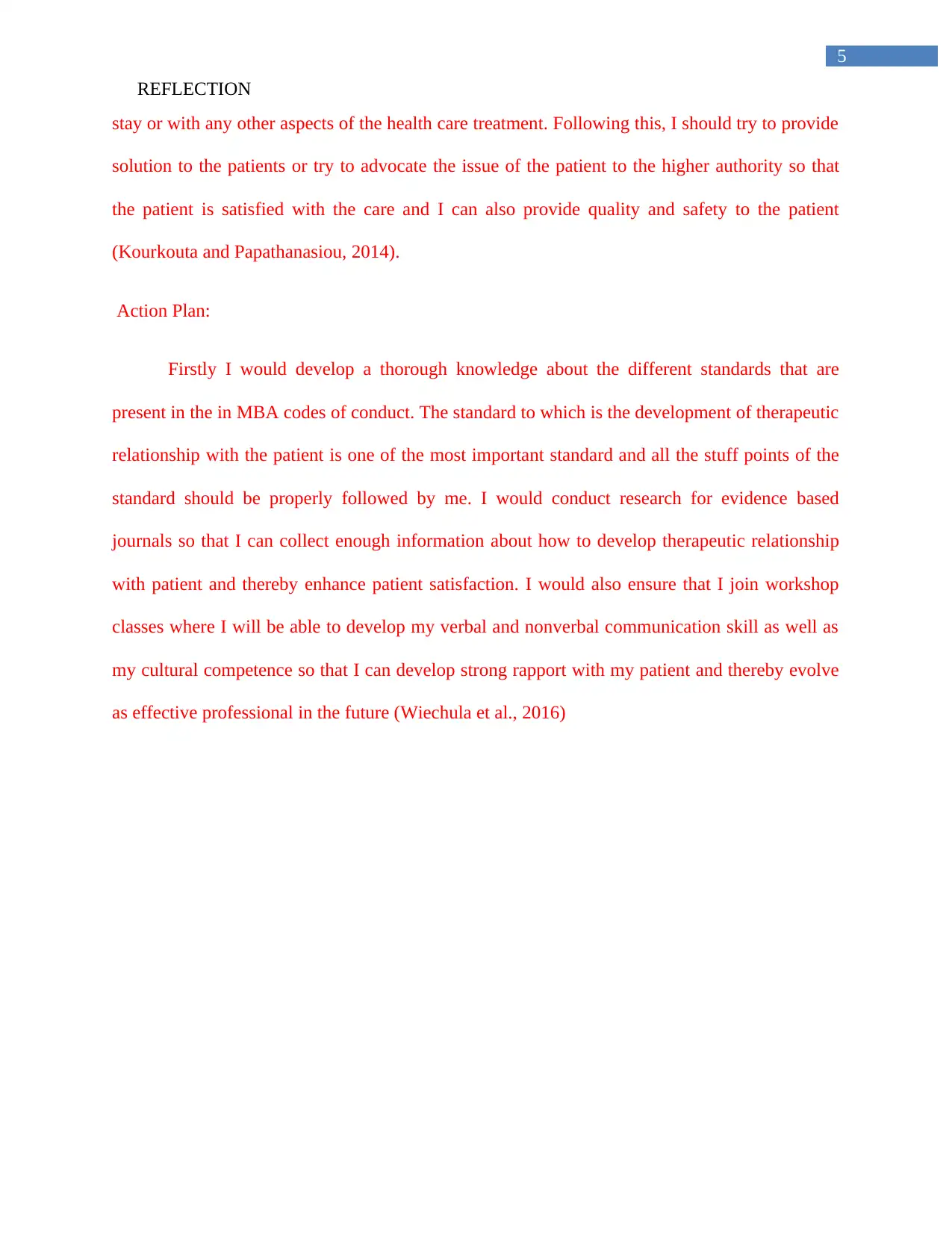
5
REFLECTION
stay or with any other aspects of the health care treatment. Following this, I should try to provide
solution to the patients or try to advocate the issue of the patient to the higher authority so that
the patient is satisfied with the care and I can also provide quality and safety to the patient
(Kourkouta and Papathanasiou, 2014).
Action Plan:
Firstly I would develop a thorough knowledge about the different standards that are
present in the in MBA codes of conduct. The standard to which is the development of therapeutic
relationship with the patient is one of the most important standard and all the stuff points of the
standard should be properly followed by me. I would conduct research for evidence based
journals so that I can collect enough information about how to develop therapeutic relationship
with patient and thereby enhance patient satisfaction. I would also ensure that I join workshop
classes where I will be able to develop my verbal and nonverbal communication skill as well as
my cultural competence so that I can develop strong rapport with my patient and thereby evolve
as effective professional in the future (Wiechula et al., 2016)
REFLECTION
stay or with any other aspects of the health care treatment. Following this, I should try to provide
solution to the patients or try to advocate the issue of the patient to the higher authority so that
the patient is satisfied with the care and I can also provide quality and safety to the patient
(Kourkouta and Papathanasiou, 2014).
Action Plan:
Firstly I would develop a thorough knowledge about the different standards that are
present in the in MBA codes of conduct. The standard to which is the development of therapeutic
relationship with the patient is one of the most important standard and all the stuff points of the
standard should be properly followed by me. I would conduct research for evidence based
journals so that I can collect enough information about how to develop therapeutic relationship
with patient and thereby enhance patient satisfaction. I would also ensure that I join workshop
classes where I will be able to develop my verbal and nonverbal communication skill as well as
my cultural competence so that I can develop strong rapport with my patient and thereby evolve
as effective professional in the future (Wiechula et al., 2016)
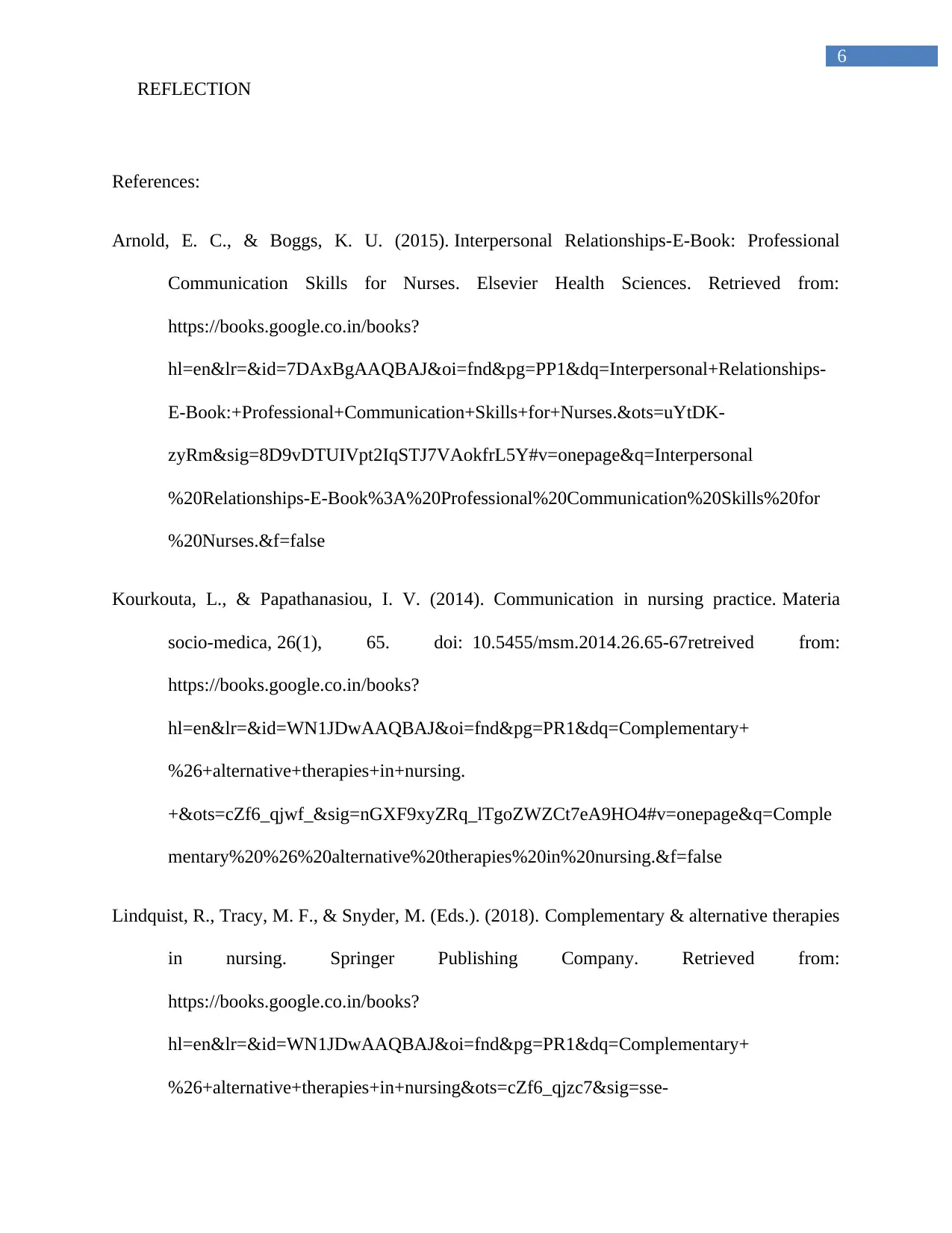
6
REFLECTION
References:
Arnold, E. C., & Boggs, K. U. (2015). Interpersonal Relationships-E-Book: Professional
Communication Skills for Nurses. Elsevier Health Sciences. Retrieved from:
https://books.google.co.in/books?
hl=en&lr=&id=7DAxBgAAQBAJ&oi=fnd&pg=PP1&dq=Interpersonal+Relationships-
E-Book:+Professional+Communication+Skills+for+Nurses.&ots=uYtDK-
zyRm&sig=8D9vDTUIVpt2IqSTJ7VAokfrL5Y#v=onepage&q=Interpersonal
%20Relationships-E-Book%3A%20Professional%20Communication%20Skills%20for
%20Nurses.&f=false
Kourkouta, L., & Papathanasiou, I. V. (2014). Communication in nursing practice. Materia
socio-medica, 26(1), 65. doi: 10.5455/msm.2014.26.65-67retreived from:
https://books.google.co.in/books?
hl=en&lr=&id=WN1JDwAAQBAJ&oi=fnd&pg=PR1&dq=Complementary+
%26+alternative+therapies+in+nursing.
+&ots=cZf6_qjwf_&sig=nGXF9xyZRq_lTgoZWZCt7eA9HO4#v=onepage&q=Comple
mentary%20%26%20alternative%20therapies%20in%20nursing.&f=false
Lindquist, R., Tracy, M. F., & Snyder, M. (Eds.). (2018). Complementary & alternative therapies
in nursing. Springer Publishing Company. Retrieved from:
https://books.google.co.in/books?
hl=en&lr=&id=WN1JDwAAQBAJ&oi=fnd&pg=PR1&dq=Complementary+
%26+alternative+therapies+in+nursing&ots=cZf6_qjzc7&sig=sse-
REFLECTION
References:
Arnold, E. C., & Boggs, K. U. (2015). Interpersonal Relationships-E-Book: Professional
Communication Skills for Nurses. Elsevier Health Sciences. Retrieved from:
https://books.google.co.in/books?
hl=en&lr=&id=7DAxBgAAQBAJ&oi=fnd&pg=PP1&dq=Interpersonal+Relationships-
E-Book:+Professional+Communication+Skills+for+Nurses.&ots=uYtDK-
zyRm&sig=8D9vDTUIVpt2IqSTJ7VAokfrL5Y#v=onepage&q=Interpersonal
%20Relationships-E-Book%3A%20Professional%20Communication%20Skills%20for
%20Nurses.&f=false
Kourkouta, L., & Papathanasiou, I. V. (2014). Communication in nursing practice. Materia
socio-medica, 26(1), 65. doi: 10.5455/msm.2014.26.65-67retreived from:
https://books.google.co.in/books?
hl=en&lr=&id=WN1JDwAAQBAJ&oi=fnd&pg=PR1&dq=Complementary+
%26+alternative+therapies+in+nursing.
+&ots=cZf6_qjwf_&sig=nGXF9xyZRq_lTgoZWZCt7eA9HO4#v=onepage&q=Comple
mentary%20%26%20alternative%20therapies%20in%20nursing.&f=false
Lindquist, R., Tracy, M. F., & Snyder, M. (Eds.). (2018). Complementary & alternative therapies
in nursing. Springer Publishing Company. Retrieved from:
https://books.google.co.in/books?
hl=en&lr=&id=WN1JDwAAQBAJ&oi=fnd&pg=PR1&dq=Complementary+
%26+alternative+therapies+in+nursing&ots=cZf6_qjzc7&sig=sse-
Paraphrase This Document
Need a fresh take? Get an instant paraphrase of this document with our AI Paraphraser
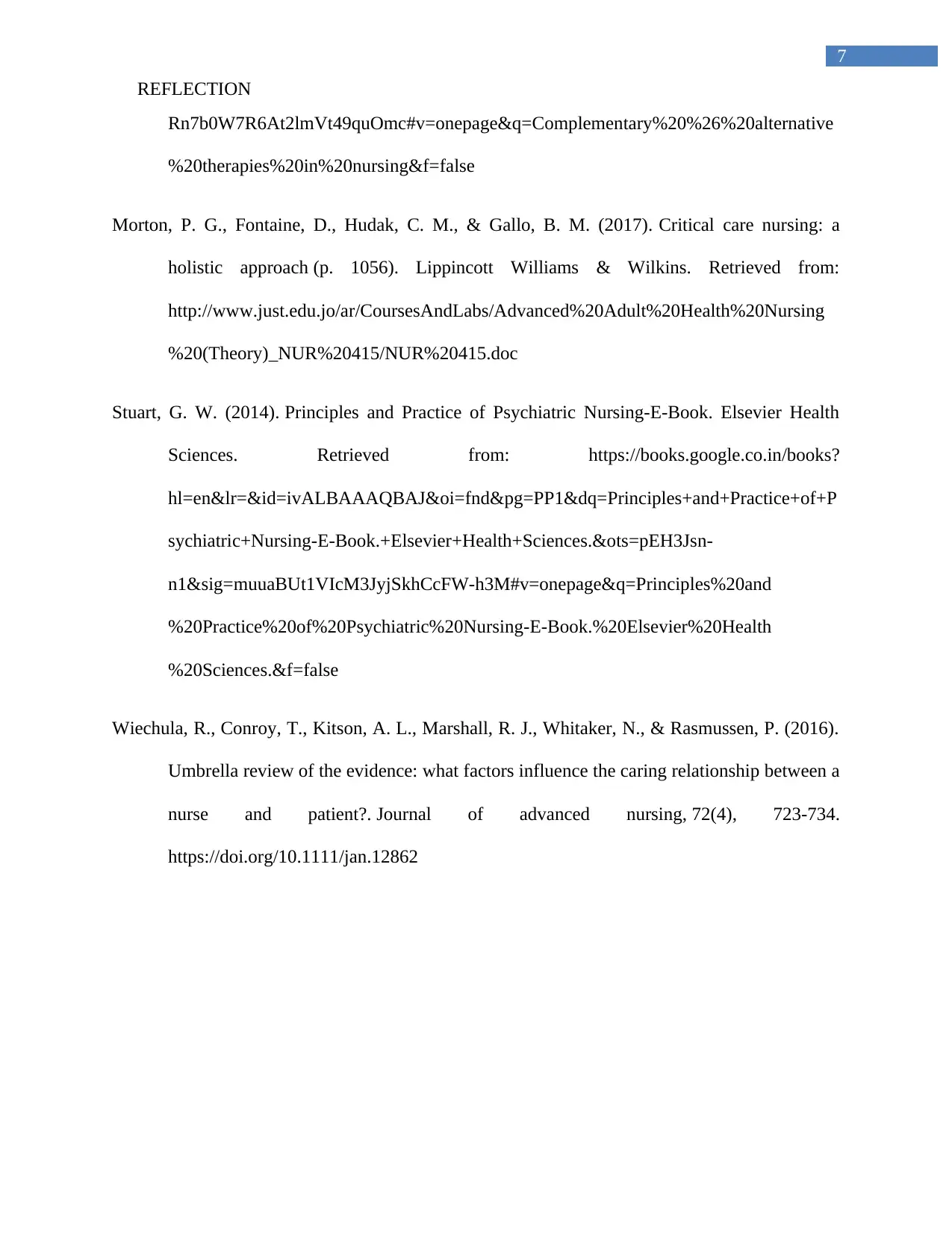
7
REFLECTION
Rn7b0W7R6At2lmVt49quOmc#v=onepage&q=Complementary%20%26%20alternative
%20therapies%20in%20nursing&f=false
Morton, P. G., Fontaine, D., Hudak, C. M., & Gallo, B. M. (2017). Critical care nursing: a
holistic approach (p. 1056). Lippincott Williams & Wilkins. Retrieved from:
http://www.just.edu.jo/ar/CoursesAndLabs/Advanced%20Adult%20Health%20Nursing
%20(Theory)_NUR%20415/NUR%20415.doc
Stuart, G. W. (2014). Principles and Practice of Psychiatric Nursing-E-Book. Elsevier Health
Sciences. Retrieved from: https://books.google.co.in/books?
hl=en&lr=&id=ivALBAAAQBAJ&oi=fnd&pg=PP1&dq=Principles+and+Practice+of+P
sychiatric+Nursing-E-Book.+Elsevier+Health+Sciences.&ots=pEH3Jsn-
n1&sig=muuaBUt1VIcM3JyjSkhCcFW-h3M#v=onepage&q=Principles%20and
%20Practice%20of%20Psychiatric%20Nursing-E-Book.%20Elsevier%20Health
%20Sciences.&f=false
Wiechula, R., Conroy, T., Kitson, A. L., Marshall, R. J., Whitaker, N., & Rasmussen, P. (2016).
Umbrella review of the evidence: what factors influence the caring relationship between a
nurse and patient?. Journal of advanced nursing, 72(4), 723-734.
https://doi.org/10.1111/jan.12862
REFLECTION
Rn7b0W7R6At2lmVt49quOmc#v=onepage&q=Complementary%20%26%20alternative
%20therapies%20in%20nursing&f=false
Morton, P. G., Fontaine, D., Hudak, C. M., & Gallo, B. M. (2017). Critical care nursing: a
holistic approach (p. 1056). Lippincott Williams & Wilkins. Retrieved from:
http://www.just.edu.jo/ar/CoursesAndLabs/Advanced%20Adult%20Health%20Nursing
%20(Theory)_NUR%20415/NUR%20415.doc
Stuart, G. W. (2014). Principles and Practice of Psychiatric Nursing-E-Book. Elsevier Health
Sciences. Retrieved from: https://books.google.co.in/books?
hl=en&lr=&id=ivALBAAAQBAJ&oi=fnd&pg=PP1&dq=Principles+and+Practice+of+P
sychiatric+Nursing-E-Book.+Elsevier+Health+Sciences.&ots=pEH3Jsn-
n1&sig=muuaBUt1VIcM3JyjSkhCcFW-h3M#v=onepage&q=Principles%20and
%20Practice%20of%20Psychiatric%20Nursing-E-Book.%20Elsevier%20Health
%20Sciences.&f=false
Wiechula, R., Conroy, T., Kitson, A. L., Marshall, R. J., Whitaker, N., & Rasmussen, P. (2016).
Umbrella review of the evidence: what factors influence the caring relationship between a
nurse and patient?. Journal of advanced nursing, 72(4), 723-734.
https://doi.org/10.1111/jan.12862
1 out of 8
Related Documents
Your All-in-One AI-Powered Toolkit for Academic Success.
+13062052269
info@desklib.com
Available 24*7 on WhatsApp / Email
![[object Object]](/_next/static/media/star-bottom.7253800d.svg)
Unlock your academic potential
© 2024 | Zucol Services PVT LTD | All rights reserved.




